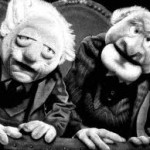 When I was a kid, one of my favorite television shows starred Kermit the Frog. No, not Sesame Street, though I loved that program for a time as well. It was the Muppet Show. Jim Henson, God rest his soul, was a genius. And I will always be grateful to him for creating such characters as Gonzo, Beaker, Fozzie Bear, and the Swedish Chef (You-Tube a few old Chef sketches – they are still hilarious).
When I was a kid, one of my favorite television shows starred Kermit the Frog. No, not Sesame Street, though I loved that program for a time as well. It was the Muppet Show. Jim Henson, God rest his soul, was a genius. And I will always be grateful to him for creating such characters as Gonzo, Beaker, Fozzie Bear, and the Swedish Chef (You-Tube a few old Chef sketches – they are still hilarious).
Obviously, no reference to the Muppet Show would be complete without discussing those Muppet merchants of doom and gloom: Statler and Waldorf. Those were the two old men who sat in the balcony and complained about, well, everything. According to Statler and Waldorf, the actors could not deliver their lines properly. The show writers were rank amateurs. The rest of the cast labored beneath the bulging, cynical eyes of these two critics. No one could do anything right. Statler and Waldorf have always been, in my mind, the poster boys for the Old Testament prophets; crotchety old men, sitting high and mighty apart from others, mad at the world, and who can’t wait until the curtain drops, the show ends, and everyone and everything is thankfully ushered into the fire.
But I am learning that my thinking about prophets and prophecy is wrong. The prophet is not a critic, though he is often critical. He is not a madman, though he is often angry. He is not observing from the upper gallery at all. The prophet is on stage, creatively pointing to a better world. Or another way to think about it: The prophets weren’t coroners pronouncing death on the world. They were physicians come to the world with the necessary medication. When we think of prophecy, we must learn to think in terms of hope, not of destruction.
Walter Brueggemann says that the prophets shattered the status quo, and pointed to new possibilities. They spoke of the future world, not necessarily as it will be, but the way it could and should be. They described the world as God was making it.
The prophet moved people to hope in a future much different than the life they were living. Prophets arose during dark and dangerous days, often when people were steeped in the disastrous consequences of their transgressions, or surrounded by their enemies, or with their social, religious, and economic structures in ruin.
It was then a prophet would take up his or her brush and paint a picture of a much different future: When the lion would lay down with the lamb, when God would rule and live among his people, when the goodness of creation would be restored. There was not always a host of detail, but there was always hope. Things could and would change.
The supreme prophecy, of course, was about the One who would bring God’s world to earth – God’s kingdom. It was the prophecy of the coming Messiah. From Isaiah 7: “The virgin will be with child and will give birth to a son, and will call him Immanuel.”
The New Testament sees the birth of Jesus as the fulfillment of that prophecy. We read in Matthew that Joseph was considering not marrying Mary. Why? Well, she was pregnant, and he knew it wasn’t his baby. But he was assured, as crazy as it sounds, by one of God’s angels, that the child inside her womb was the child Isaiah spoke of six centuries earlier.
And the name to be attached to this child was the name, Immanuel, which means, “God with us.” The extraordinary thing is not that the prophecy came true, this is the world God envisioned after all. The extraordinary thing is that God came to live on earth as a man to appropriate his vision. Initiated by Jesus, and alive in the human heart, God is making all things new. That is extraordinary, and that is hope. That is our hope. And no amount of armchair or balcony-sitting cynicism can extinguish such optimism.

